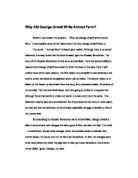However, Orwell is equally critical of alternative styles of leadership. Snowball and Napoleon in the novel engineer the revolution and assume the dominant leadership positions. Marx, in his communist manifesto stated that it was necessary that a state, immediately after a revolution, would need a strong, authoritarian government to stabilise the country before full communism could take place. In Revolutionary Russia Lenin, Trotsky and Stalin took this role. Lenin was charismatic, a rousing speaker and inspired the serfs who were renamed the proletariat. Trotsky was similar to Lenin and both upheld the ideals of communism and wanted to make the lives of the workers better and provide a fair distribution of wealth. Stalin was equally inspirational however he wanted complete control and to increase Russia’s power in the world. Through Snowball and Napoleon, Orwell makes the point that communism can not work in practice. The idealism of Trotsky and Lenin is shown in the reading classes and shorter working days. After Jones is ousted from the farm, all reins, whips and bridles, tools of oppression, are burned. It seems that Animalism could work.
However, as in Soviet Russia, a hierarchy starts to form. The new leaders start to take advantage of their new power and realise that they can use this to make their own lives easier. This is represented in the novel by the milk and apples, which are commandeered by the pigs. Even the idealist Snowball is complicit in this. Eventually Snowball is chased off the farm by Napoleon’s dogs and Napoleon assumes complete power. One autocratic dictator has been replaced by another. The point Orwell is making is that all human beings given some power will abuse it and the idealised utopia will never exist because human beings need to create it. Orwell makes the point through the cat that wants to chase the rats and birds that nature is hierarchical and it is the natural law of survival to compete. Equality is unnatural however appealing.
Orwell is also critical of the means by which any state controls its people. Religion, the media, education, laws and the police and army are all tools that have been used in the past to keep the masses under control.
Marx said in ‘The Communist Manifesto’,
“Religion is the opiate of the masses”
By this he meant that organised religion, represented by the church, is like a drug. People need the answers that religion provides to make sense of their lives. As a consequence, people begin to rely on religion and independent thought is suppressed. Religion provides a code of conduct that dictates how people should live their lives however it also provides comfort for earthly hardships by promising a better life in the next world. Moses the raven represents this in the novel. He tells the animals about Sugarcandy Mountain which is a land far away. His stories provide hope for the overworked animals and help them to work harder. However, the fantastical nature of his descriptions is like a fairy story and Orwell is trying to show that human equivalents, such as heaven, prevent people from challenging their conditions in this life. Moses is also the pet of Jones, who reports back to him the state of the farm after the rebellion. Orwell is commenting here on the way that the church and government combine to control the people. Religion has had great power within the government of a state throughout history.
Another social institution that Orwell comments on is the means of mass communication within a state. Squealer is Napoleon’s right hand man and liaises between him and the other animals. He twists and manipulates the truth, modifying and changing the commandments as necessary to suit Napoleon’s own ends. He also provides answers for inexplicable events such as the destruction of the windmill, which is blamed on Snowball. The animals have no way of checking the truth of his information and Squealer is so persuasive that his propaganda soon is taken as fact. This reflects state-controlled media, which is still prevalent in many countries of the world today. Without a free press or television only one point of view is given. This is obviously open to abuse and history and the news can be changed at will. This then becomes yet another tool by which a totalitarian government can control the people.
Maybe the most damning criticism of Orwell’s, however, is that given to the animals themselves. The reader is encouraged to sympathise with the oppressed animals and we feel anger when the hens and pigs are killed in the show trials, anger when Boxer, who has always been loyal is sent to the glue factory and betrayed when Napoleon is seen as the same as the humans at the end. However, All these things come to pass because the animals are passive and allow themselves to be manipulated by Squealer and Napoleon. They never challenge what they are told and when they do and are severely punished they never rise up against their new oppressor. Orwell is showing that the workers never actually recognise their collective strength and use it. The animals need to be led. Consequently they are at the mercy of whoever is strong enough to dominate and govern.
This is probably the most pessimistic message of the novel and the most troubling for the reader. Can we ever control our own lives or is human nature too flawed to allow utopia to exist? Orwell seems to be suggesting that we have to accept this situation as history has shown we make the same mistakes time and again.







